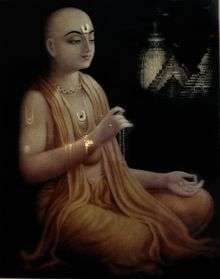Shikshashtakam
The Shikshashtakam (IAST: Śikṣāṣṭakam) is a 16th-century Gaudiya Vaishnava Hindu prayer of eight verses composed in the Sanskrit language. They are the only verses left personally written by Chaitanya Mahaprabhu (1486 – 1534)[1] with the majority of his philosophy being codified by his primary disciples, known as the Six Goswamis of Vrindavan.[2] The Shikshashtakam is quoted within the Chaitanya Charitamrita,[3] Krishnadasa Kaviraja Goswami's biography of Chaitanya Mahaprabhu, written in Bengali. The name of the prayer comes from the Sanskrit words Śikṣā, meaning 'instruction', and aṣṭaka, meaning 'consisting of eight parts', i.e., stanzas. The teachings contained within the eight verses are believed to contain the essence of all teachings on Bhakti yoga within the Gaudiya tradition.
Text

The first eight verses of the following are the complete text of the Shikshashtakam, as written in Sanskrit by Sri Chaitanya Mahaprabhu. They are found in Krishnadasa Kaviraja's Sri Chaitanya Charitamrita (Antya-līlā, chapter 20, verses 12, 16, 21, 29, 32, 36, 39 and 47).[4] The final verse is a Bengali quotation from Sri Chaitanya Charitamrita, Antya-līlā 20.65 - it is not part of the actual Shikshashtakam, but is often appended to the end when it is recited, describing the result of reciting the Shikshashtakam faithfully.[5][6]
Verse 1
ceto-darpaṇa-mārjanam bhava-mahā-dāvāgni-nirvāpaṇaḿ
śreyaḥ-kairava-candrikā-vitaraṇaḿ vidyā-vadhū-jīvanam
ānandāmbudhi-vardhanaḿ prati-padaḿ pūrṇāmṛtāsvādanaḿ
sarvātma-snapanaḿ paraḿ vijayate śrī-kṛṣṇa-sańkīrtanam
चेतो-दर्पण-मार्जनं भव-महा-दावाग्नि-निर्वापणं
श्रेयः-कैरव-चन्द्रिका-वितरणं विद्या-वधू-जीवनम्
आनन्दाम्बुधि-वर्धनं प्रति-पदं पूर्णामृतास्वादनं
सर्वात्म-स्नपनं परं विजयते श्री-कृष्ण-सण्कीर्तनम्
Translation
Literal:
Cleansing the mirror of the heart, mind, and consciousness (citta), extinguishing the great forest fire of material existence, spreading the moonshine of the lotus of good fortune, the life of the spouse of all knowledge, increasing the ocean of bliss, giving a taste of full nectar (amrita) at each step, bathing all souls, let there be all victory for the congregational hearing and chanting of the Holy Names of Lord Kṛṣṇa.
Verse 2
nāmnām akāri bahudhā nija-sarva-śaktis
tatrārpitā niyamitaḥ smaraṇe na kālaḥ
etādṛśī tava kṛpā bhagavan mamāpi
durdaivam īdṛśam ihājani nānurāgaḥ
Translation
Literal: In your (divine) names manifested various kinds of full potencies (shaktis) therein bestowed, with no rules according to time for remembering them, O Lord, you are so merciful, but it is my misfortune here that I have no anuraga (interest) in those names.
Verse 3
tṛṇād api sunīcena
taror api sahiṣṇunā
amāninā mānadena
kīrtanīyaḥ sadā hariḥ
Translation
Literal:
By considering (self) lower than straw, more tolerant than a tree, giving honour to those devoid honour, always do kirtana of hari.
Verse 4
na dhanaḿ na janaḿ na sundarīḿ
kavitāḿ vā jagad-īśa kāmaye
mama janmani janmanīśvare
bhavatād bhaktir ahaitukī tvayi
Translation
Literal:
No wealth, no followers, no beauty or poetic praise desire I; in birth after birth let there be devotion unmotived unto thee o ishvara.
Alternatively:
O Lord of the Universe, I do not desire wealth, followers, beautiful women, nor the flowery language of the vedas; let me have only causeless devotion to you, birth after birth.
Verse 5
ayi nanda-tanūja kińkaraḿ
patitaḿ māḿ viṣame bhavāmbudhau
kṛpayā tava pāda-pańkaja-
sthita-dhūlī-sadṛśaḿ vicintaya
Translation
Literal:
o son of nanda, servitor me fallen in venom of ocean of material existence, by your mercy (kripa) consider me as particle of dust at your lotus-feet.
Verse 6
nayanaḿ galad-aśru-dhārayā
vadanaḿ gadgada-ruddhayā girā
pulakair nicitaḿ vapuḥ kadā
tava nāma-grahaṇe bhaviṣyati
Translation
Literal:
With eyes flowing tear-streams, voice faltering, words choked, with ecstatic feelings in body, when shall i be able to chant thy (divine) name?
Verse 7
yugāyitaḿ nimeṣeṇa
cakṣuṣā prāvṛṣāyitam
śūnyāyitaḿ jagat sarvaḿ
govinda-viraheṇa me
Translation
Literal:
moment comparable to yuga, eyes showering tears, empty appears whole world to me in separation of govinda
Verse 8
āśliṣya vā pāda-ratāḿ pinaṣṭu mām
adarśanān marma-hatāḿ karotu vā
yathā tathā vā vidadhātu lampaṭo
mat-prāṇa-nāthas tu sa eva nāparaḥ
Translation
Literal:
by embracing with enraptment or trampling with feet, or breaking my heart by not granting vision, or flirting here and there as destined, master of my life is he, verily no other.
Extra verse 9
This verse was added to the 8 verses written by Chaitanya.
prabhura ‘śikṣāṣṭaka’-śloka yei paḍe, śune kṛṣṇe prema-bhakti tāra bāḍe dine-dine
Translation
If anyone recites or hears these eight verses of instruction by Śrī Caitanya Mahāprabhu, their ecstatic love and devotion (prema-bhakti) for Kṛṣṇa increases day by day. [7]
References
- Satsvarupa, Dasa Goswami (2005). "Gaura Purnima - Sri Siksastakam - Reflections". www.iskcon.com. Retrieved 2008-08-22.
- Gaudiya.com "Sri Chaitanya is not known to have written anything but a series of verses known as the Siksastaka, the eight verses of instruction. He requested a select few among his followers, who later came to be known as the Six Goswamis of Vrindavan, to systematically present in their writings the theology of bhakti he had taught."
- CC-Al 6.239 "One who thinks himself lower than grass, who is more tolerant than a tree, and who does not expect personal honor but is always prepared to give respect to others can very easily always chant the holy name of the Lord."
- "Archived copy". Archived from the original on 2010-06-21. Retrieved 2010-05-17.CS1 maint: archived copy as title (link)
- https://vedabase.io/en/library/cc/antya/20/65/
External links
- Sikshashtaka: Lord Chaitanya's Mission (vedabase.net)
- Shikshashtakam / शिक्षाष्टकं in English and Devanagari
- "Sri Siksastakam". www.iskcon.com.